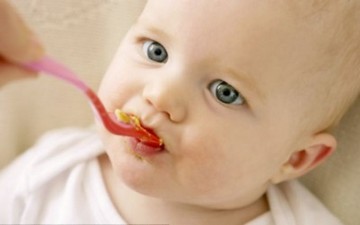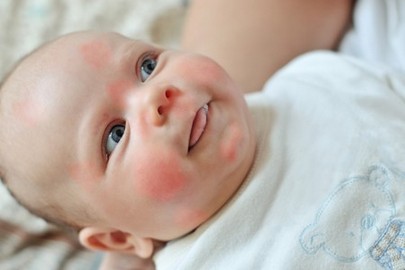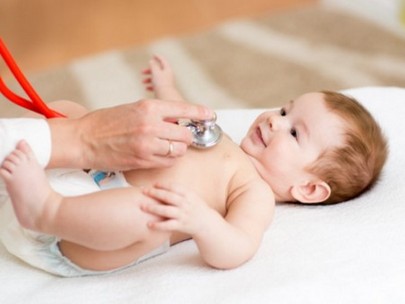Food Allergies In Babies

Contents:
- Symptoms of Food Allergy in Babies
- Causes of Food Allergy in Children
- Treatment of Food Allergy Babies
- What Foods Might My Child Be Allergic To?
Baby Food Allergies
Food allergy in children is usually caused by unbalanced diet. Sometimes it also depends on mother, who breastfeeds the baby: for example, if she drinks too much cow’s milk, eats too many exotic products (fruits) or takes too much medicine, this can cause allergic reactions in her baby.
I want to tell you how I’ve faced this problem. For example, I was craving chocolate during last months of pregnancy: I wanted to eat chocolate cakes, chocolate ice-cream and chocolate itself. Sometimes they say that if woman craves sweets during pregnancy, she’ll give birth to a girl, and that’s exactly our case, but this isn’t the point.
I didn’t know that it will harm my baby girl, but it did: she was born with red spots on her cheeks, her skin was peeling and she had diaper rash. If I knew about this beforehand, I would avoid sweets as much as possible. Of course, when I came back from maternity hospital, I wanted to taste a piece of cake that guests brought me, but I couldn’t. Thankfully, our pediatrician visited the next day and told me about a diet that I should stick to. When I’ll be pregnant with my second baby, I’ll know what to eat without harming my future baby’s health.
Symptoms of Food Allergy in Babies

Baby with food allergy may suffer from atopic dermatitis (rash on cheeks). If you stick to a strict balanced diet, allergy symptoms may disappear in first 6 years of baby’s live (or even in a year if allergy is mild). Redness on my daughter’s face had disappeared somewhere during 6th month of her life and her skin stopped peeling during 2nd month already.
Causes of Food Allergy in Children
Usually baby has food allergy if its mother is unable to breastfeed it long enough or if mother ate a lot of allergy causing products during her pregnancy. Food allergy can also be caused by baby’s inadequate diet based on modern dairy blends. Surely, you shouldn’t save money on baby food and you have to choose high quality blends that will be good for your child. However, sometimes only pediatrician can help you with picking the right blends.
If a baby was introduced to solid foods early (in first 6 months of its life) and some products don’t fit its age, this can cause food allergy too. Personally, I started feeding my daughter with apple mash first, then added the carrot one, then the potato and the squash ones. Moreover, I made all these mashes by myself. Yes, we did buy some turkey mash, prune mash, etc., but most of the time I cooked them on my own: not because I didn’t trust their quality, but because it was easy, convenient and cheap.
Unfavorable ecological situation is another cause of food allergy in children. Even adults living in areas with high level of pollution have health problems, and little children suffer from this even more.
Genetic predisposition to food allergies also has to be taken into account. For example, if both parents are allergic, the risk of them having an allergic baby is quite high (from 40 to 80 percent). If only one parent is allergic, the risk is 20-40 percent, and if one of the relatives suffers from allergy, the risk is 25-35 percent.
Treatment of Food Allergy in Babies

If you notice the rash on baby’s skin that appears in first three days after you gave your baby a certain food or medication, you have to remove the cause of allergy for 2-3 months and avoid adding new food to baby’s diet. In other words, forget about your favorite foods for a long time and avoid risks as much as possible. Or stop trying to add new product to baby’s diet if a baby seems to be allergic to it.
However, after some time you will need to add new products or dairy blends to baby’s diet. Try adding one product at a time and do it slowly during two weeks. For example, give baby one teaspoon of some mash, then wait for 2-3 days and see if allergy appears. If everything is fine, continue giving your baby this mash. The same goes for breastfeeding mothers: eat a small amount of a certain product and look at baby’s reaction. If allergy appears, forget about this product for a couple of months.
Do not forget about healthy baths too. I added liquors made from bur-marigold herbs, oak bark, chamomile and burdock roots, and that helped a lot. However, be sure to use different liquors: for example, today I make a chamomile bath for my baby, tomorrow – bur-marigold one, the day after tomorrow – ordinary one, and so on.
What Foods Might My Child Be Allergic To?
Nowadays scientists know about nearly 160 food allergens able to cause allergic reactions. Most of the food allergens are proteins. Only certain products (like peanuts, cow’s milk and eggs) have them. The others (like codfish) have only one allergenic protein that dominates. Most of the children (76 %) are allergic to 3 and more food proteins.
Fats and carbs aren’t allergens by themselves but can cause allergic reactions if combined with protein (for example, glycoprotein). Mineral salts (including microelements) aren’t allergens at all. There are certain foods that are considered the most allergenic: they have sensitizing effect and cause allergy often.
These foods are:
- whole milk;
- eggs;
- fish (fresh, salted, smoked, fresh-soup);
- seafood (shrimps, crabs, shellfish), caviar;
- wheat, rye;
- strawberry, mango, persimmon, melon, bananas;
- carrots, tomatoes, celery, bell pepper;
- chocolate;
- coffee, cocoa;
- nuts (hazelnuts, almond, walnuts, etc.);
- honey;
- mushrooms.
People can be allergic to all types of milk or fish, or to one type only (for example, to cow’s milk or to herring).
If one is allergic to egg proteins, their allergy can progress when eggs are combined with chicken and broth in diet. Eggs’ whites are usually more allergenic than yolks. Sea fish causes allergy more often than the river one, but most of the kids usually react to all types of fish.
There are over 40 allergens in wheat flour, that’s why it is considered the common cause of allergy in children. Allergy to barley and oats is less common. According to experts, up to 50 % of examined children are allergic to rice. Some researchers noticed that bananas cause allergy very often: nearly 80 % of children are allergic to them.
You should remember that the following products often cause allergy too:
- beef, chicken, broth made of chicken and other birds;
- buckwheat, oats and rice;
- peas, beans and soybeans;
- potatoes, beetroots, turnips;
- apricots, peaches;
- cranberries, cowberries, blueberries;
- cherries, blackcurrant and canker-rose.
In some cases people are allergic to 2-3 and more products simultaneously.
Video: Food Allergies, When to Worry